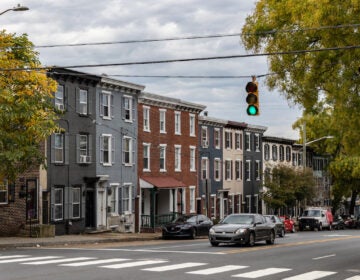‘Heartless’: Sponsor of medical aid in dying bill slams Delaware Gov. Carney’s veto
Retiring state Rep. Paul Baumbach has pushed for medical aid in dying legislation since 2015. Gov. Carney said he was “morally opposed” to it becoming law.
Listen 0:53
FILE - Delaware Gov. John Carney speaks at the Major Joseph R. "Beau" Biden III National Guard/Reserve Center in New Castle, Del., Jan. 19, 2021. (AP Photo/Evan Vucci, File)
From Philly and the Pa. suburbs to South Jersey and Delaware, what would you like WHYY News to cover? Let us know!
This story was supported by a statehouse coverage grant from the Corporation for Public Broadcasting.
Delaware Gov. John Carney has vetoed legislation that would have allowed medical aid in dying.
The Ron Silverio/Heather Block Delaware End of Life Options Act is named in honor of two advocates of the legislation. Both died in 2018.
It’s sometimes known as “physician-” or “medically assisted suicide.” The bill would have allowed people with fewer than six months to live to request and ingest medication to end their lives.
Carney, who is Catholic, said he was against allowing the terminally ill to end their lives with a physician’s help in his veto message. He said he has been consistent and public about his position on this issue.
“Although I understand not everyone shares my views, I am fundamentally and morally opposed to state law enabling someone, even under tragic and painful circumstances, to take their own life,” he said in the statement.
The Bishop for the Diocese of Wilmington William Koenig encouraged Delaware Catholics to oppose the medical-aid-in-dying legislation.
“We’re all made in God’s image,” Koenig said according to the Diocese newspaper, The Dialog. “We’re not the ones that end life. We’re not the ones that decide when it’s time to end our lives.
The lead sponsor, Rep. Paul Baumbach who is not running for re-election, has pushed for the legislation since 2015. He said he was angry about the governor’s veto.
“I think he’s ill-informed and ill-advised, and I think he did a major decision that is going to be harming people who least deserve it, those who are dying,” he said. “I think it’s heartless. It’s unfortunately not a surprise. We’ve seen the governor disregard the vast majority of Delawareans multiple times, but I thought there was more humanity in him, and I was wrong.”
Wilmington resident Judy Govatos was diagnosed with cancer in 2014 and has had it twice. She’s currently in remission, but she has said she worries about experiencing a “hellish death” because during her treatment she didn’t respond well to painkillers like morphine. She said she’s fighting for dying patients to be able to self-administer terminal medication so her friends and family won’t have to suffer through her agonizing end.
“My family and friends have been to hell and back with me already,” she said. “The idea of putting them through this again is so lacking in compassion and human decency that it is hard to imagine.”
Supporters say the legislation includes a number of safeguards, including ensuring patients are self-administering the medication, moral objection opt-outs for medical providers, waiting periods and mandatory mental health evaluations. Two doctors would be required to certify that the patient is mentally capable, making an informed decision and is acting voluntarily.
The House passed the bill 21-14, with four Democrats absent in April. The vote in the Senate originally failed 9-9, but passed days later 11-10.
Baumbach said he has been conferring with his fellow lawmakers to see if there are enough votes to override the governor’s veto. He said Speaker Valerie Longhurst, who lost her primary bid for re-election earlier this month, supports an override attempt.
It’s not clear if there are enough votes to override it. The bill did not pass with veto-proof majorities. Lawmakers would need three-fifths of each chamber to vote yes to overturn a veto.
Senate Democratic leaders issued a statement that said they were also deeply disappointed in Carney’s decision and accused the governor of selectively quoting one subgroup of the American Medical Association that opposes medical aid in dying. The governor’s veto message cites the AMA’s medical ethics code, which does say physician-assisted suicide is fundamentally incompatible with the physician’s role as healer.
But Senate leadership did not commit to trying to override the veto in its statement.
“There will come a day soon when this legislation becomes law, and Delawareans are afforded the respect and support they deserve in their final stages of life,” it stated. “We are hopeful that the next governor will embrace a renewed commitment of collaboration and partnership between Delaware’s executive and legislative branch and the broader community of stakeholders.”
Govatos said advocates will keep pushing for the bill to become law.
“Real people want this bill and you talk to anybody who’s had a bad death in their family, and they will tell you they do not want to do it again,” she said. “So I regret and feel incredibly sad about this, but I and other people like me, we will continue to struggle to come to the place where we can have a humane death.”
A number of groups representing the disability community have opposed the legislation. They said they are concerned people with disabilities could be manipulated to end their lives, instead of receiving what could be expensive medical care.
Editor’s note: This story has been edited to clarify Gov. Carney’s religious background.

Get daily updates from WHYY News!
WHYY is your source for fact-based, in-depth journalism and information. As a nonprofit organization, we rely on financial support from readers like you. Please give today.







